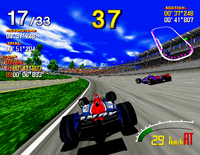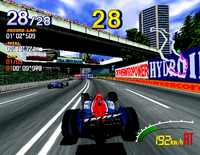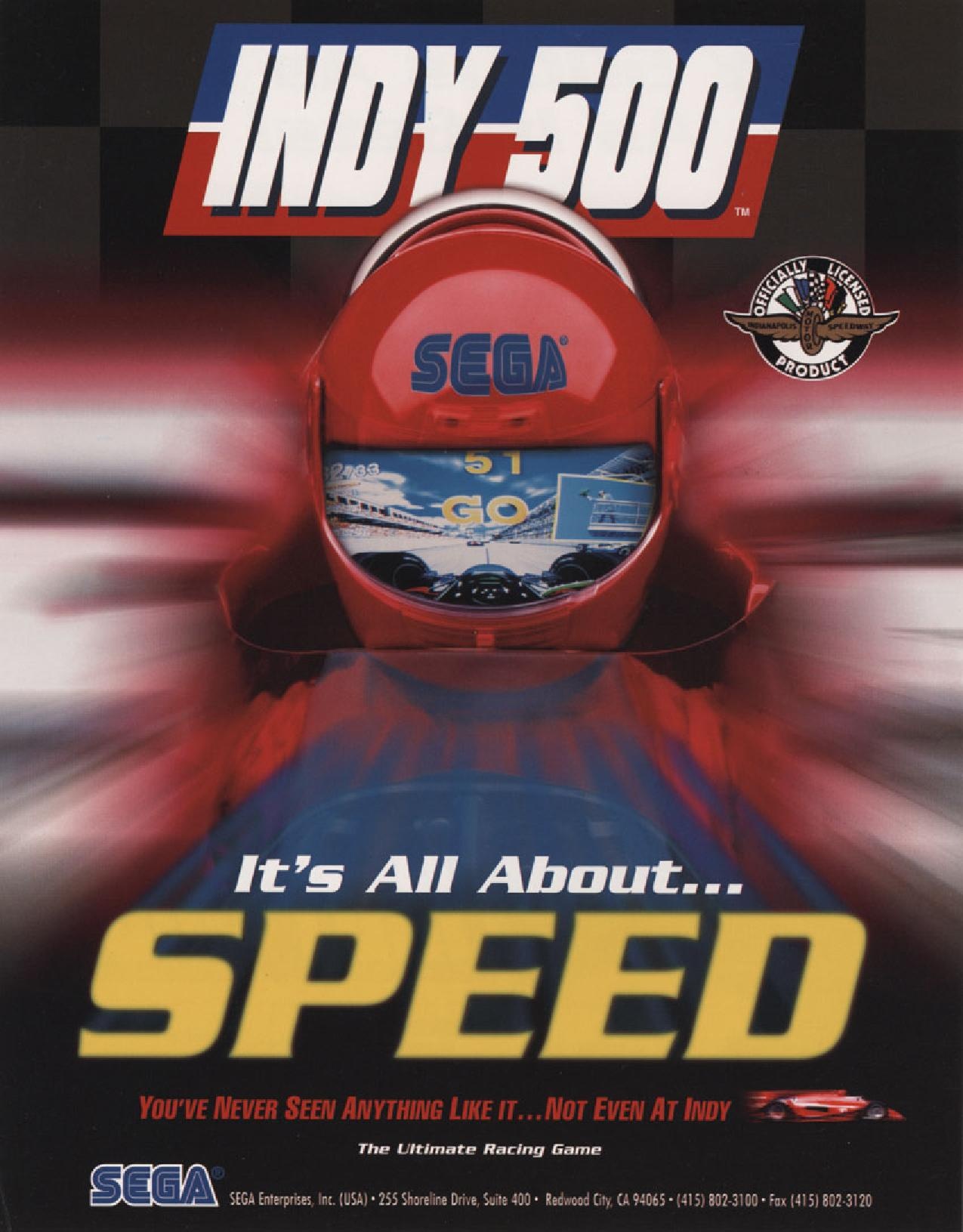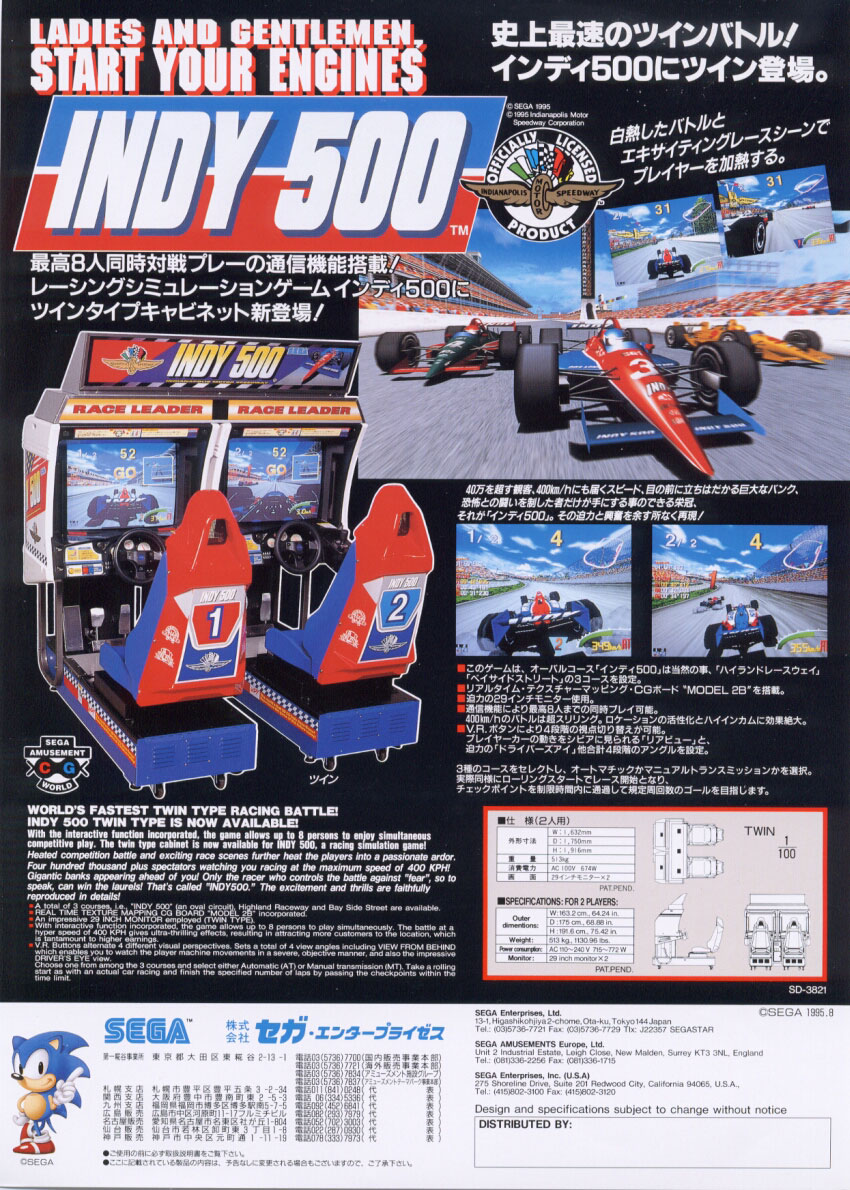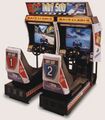Difference between revisions of "Indy 500"
From Sega Retro
| Line 52: | Line 52: | ||
==Production credits== | ==Production credits== | ||
| − | {{ | + | {{mainArticle|{{PAGENAME}}/Production credits}} |
| − | |||
| − | |||
| − | |||
| − | |||
| − | |||
| − | |||
| − | |||
| − | |||
| − | |||
| − | }} | ||
==Magazine articles== | ==Magazine articles== | ||
Revision as of 04:00, 29 March 2024
| Indy 500 | |||||||||||||||||
|---|---|---|---|---|---|---|---|---|---|---|---|---|---|---|---|---|---|
| System(s): Sega Model 2B CRX | |||||||||||||||||
| Publisher: Sega | |||||||||||||||||
| Developer: Sega AM1[1] | |||||||||||||||||
| Genre: Racing | |||||||||||||||||
|
This short article is in need of work. You can help Sega Retro by adding to it.
Indy 500 is a racing game developed by Sega AM1 and published by Sega in arcades for the Sega Model 2B CRX arcade platform in 1995. It is based upon the annual Indianapolis 500 race held in Indiana, US, and in some respects is seen as an evolution of the earlier Virtua Racing.
Contents
Gameplay
Like other Sega arcade racers, Indy 500 offers no choice of cars and only three tracks. Players can choose either automatic or manual transmission and switch between three different camera viewpoints while driving. The game is notable for simulating real world racing mechanics like drafting and tire wear. As the tires on the car wear down, the vehicle's grip decreases and it becomes more prone to sliding out of control. This can be remedied by driving through the pit lane on each track.
Tracks
| Indy 500 | |
|---|---|
| Indy 500 is a relatively faithful interpretation of the real Indianapolis 500 race track. As is the case in Daytona USA's easy track, Indy 500 has you merely drive around in circles turning left. | |
| Highland Raceway | |
| Highland Raceway is a fictional track, though is primarily inspired by Mazda Raceway Laguna Seca. | |
| Bayside Street | |
| Bayside Street is also a fictional track, though is said to be inspired by elements of Grand Prix of Long Beach and Surfers Paradise Street Circuit. |
History
Development
Two separate sources have been credited with kickstarting the game's development, both Sega of Japan and Sega of America[2]. On the Japanese side, the reaction to the success of AM2's Virtua Racing and Daytona USA led to ordering both AM1 and AM3 to create their own racing games (the latter developing Sega Rally Championship). On the American side, it was seen that Virtua Racing, despite being based on Formula One, was able to attract Indianapolis 500 fans, likely thanks to the similar car shapes, and they wanted to capitalize on it with an officially-licensed Indy 500 game.
Indy 500's history is an odd one, having once been tipped for release on Sega Model 3 hardware, before being downgraded to the Model 2 platform after a series of delays with the hardware. As a product it is not too dissimilar to the earlier Daytona USA with similar rules and features (and has a real-world track license), although unlike Daytona USA, Indy 500 never saw the same levels of success. This has been attributed to an oversaturation of racing games[2], following in the wake of several racing games by Sega, and releasing in the same month as Namco's Rave Racer[3].
Many Virtua Formula cabinets (i.e. enhanced versions of Virtua Racing) were converted into linked eight-player Indy 500 ones. These deluxe, full-motion simulators required an operator to run and were found at Sega World, Joypolis, and GameWorks venues.
Legacy
A Sega Saturn version of Indy 500 was once planned[4] for September 1996[5], but was removed from the schedules in early 1996, possibly being replaced with Daytona USA: Champion Circuit Edition[6]. The Saturn port is not thought to have progressed very far before being scrapped.
As such, Indy 500 in its original form has never been ported to a home console, although was available in the form of a vastly simplified LCD game and for the Tiger R-Zone. The Game.com game Indy 500 is also said to be a loose interpretation of the arcade release - the situation is currently unclear, as despite sharing artwork, Sega did not lend their name to the product in any way.
Sega's Indy 500 should not be confused with the 1977 Atari 2600 Indy 500, or the 1997 PlayStation Indy 500 developed by Tomy.
Production credits
- Main article: Indy 500/Production credits.
Magazine articles
- Main article: Indy 500/Magazine articles.
Promotional material
Photo gallery
Yokohama Joypolis, 8-player cabinet
Physical scans
| Sega Retro Average | |||||||||||||||||||||||||||||
|---|---|---|---|---|---|---|---|---|---|---|---|---|---|---|---|---|---|---|---|---|---|---|---|---|---|---|---|---|---|
|
| 78 | |
|---|---|
| Based on 5 reviews | |
| Model 2, US (deluxe) | ||||
|---|---|---|---|---|
| Model 2, JP (deluxe) | ||||
|---|---|---|---|---|
| Model 2, JP (twin) | ||||
|---|---|---|---|---|
References
- ↑ 1.0 1.1 Sega Arcade History, Enterbrain, page 137
- ↑ 2.0 2.1 https://www.wizforest.com/diary/150721.html (Wayback Machine: 2022-05-28 06:25)
- ↑ https://www.mobygames.com/game/140167/rave-racer/releases/arcade/
- ↑ Sega Saturn Magazine, "November 1995" (UK; 1995-10-26), page 22
- ↑ Sega FY 1997 Brand Review, page 84
- ↑ Game Players, "Vol. 9 No. 5 May 1996" (US; 1996-04-xx), page 16
- ↑ Computer & Video Games, "December 1995" (UK; 1995-11-10), page 74
- ↑ Game Informer, "April 1996" (US; 1996-0x-xx), page 57
- ↑ Next Generation, "December 1995" (US; 1995-11-21), page 207
- ↑ Player One, "Décembre 1995" (FR; 1995-1x-xx), page 46
- ↑ Sega Pro, "December 1995" (UK; 1995-11-02), page 61
| Indy 500 | |
|---|---|
|
Main page | Comparisons | Credits | Development | Magazine articles | Reception | |
| IndyCar games for Sega systems | |
|---|---|
| Mario Andretti Racing (1994) | Newman-Haas IndyCar Featuring Nigel Mansell (1994) | Danny Sullivan's Indy Heat (unreleased) | |
| Indy 500 (1995) | |
| Andretti Racing (1997) | IndyCar Racing II (unreleased) | |
| Flag to Flag (1999) | |

